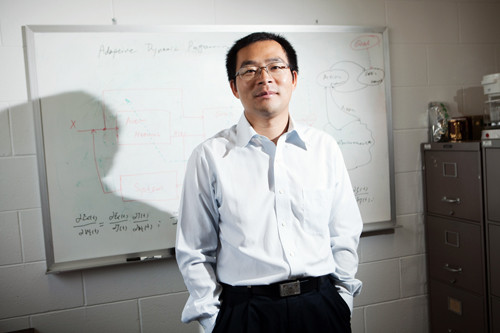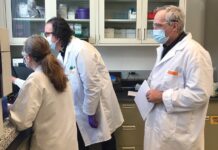
IBM’s Deep Blue supercomputer may be able to win a chess match against a world champion, but ask it to vacuum the floor and it’s game over. The computer, for all its might, remains hamstrung by its narrow focus and thus lacks the capacity to excel in numerous complex topics.
Building a better, smarter computer that can tackle chess just as easily as navigating around the kitchen table is an elusive goal that has challenged computer experts and mathematicians for years. But in nondescript offices at the University of Rhode Island in South Kingstown, professor Haibo He, 35, and his colleagues are making strides.
Led by He, the team specializes in adaptive dynamic programming. Essentially a compilation of complex mathematical formulas, the concept attempts to mimic no less than the human brain.
“The opportunity to develop truly intelligent machines will be the most fantastic thing on Earth,” said He, an assistant professor in the department of electrical, computer and biomedical engineering.
The concept is to build more than just a powerful machine that can handle one straightforward task repeatedly. He aims to construct an architecture that, with minor tweaking, can tackle any complex problem poised to it.
“What we are trying to do is build a real, true computational machine,” He said.
The possibilities are endless. He talks about a day when a computer system, in a matter of milliseconds, can analyze traffic along a busy roadway, predict the future traffic based on real-time events and past data, and then adjust traffic-control devices accordingly. He envisions a day when robots travel to the depths of mines to rescue trapped miners. But rather than a human on the surface navigating the machine, the robot has enough intelligence to undertake the rescue on its own.
“It’s all about intelligent decision-making,” He said.
The area of research has attracted interest from big corporations such as FedEx, looking for better ways to route packages and from government agencies such as the Army, searching for ways to make smarter weapons.
If that wasn’t complicated enough, add in an effort to bring online renewable energy systems such as wind turbines and solar panels that generate power sporadically. Connecting that power into the system in a safe and efficient way has become a massive challenge that holds implications even in tiny Rhode Island.
He has held informal discussions with Deepwater Wind, the Providence company looking to develop two wind farms off the coast of Rhode Island. His research also extends into training computers to restore back power systems as quickly and safely as possible after outages. Many Rhode Islanders may appreciate that after some lost power for more than a week in the wake of Tropical Storm Irene.
And with so much of state and national economics riding on a reliable electric grid, many are looking at its security. In August, the National Science Foundation awarded He and two colleagues a $499,435 grant to study the cyber security of the grid.
For He it’s a daunting but exciting challenge. Building a smarter machine has long been a passion and one clear to those around him.
“He’s a great researcher and he has this passion and he has a vision for the future,” URI associate professor Yan Sun said.
His interest in math – the foundation of much of engineering – started at a young age. As a child with no babysitter, He sat in the back of his mother’s high school math class in China. He picked up the basics of math early and went on to secure undergraduate, graduate and doctoral degrees in electrical engineering.
In 2006, he was named an assistant engineering professor at Stevens Institute of Technology in New Jersey. He started at URI two years ago teaching undergraduate and graduate courses, advising doctoral students and assisting with the school’s International Engineering Program.
He squeezes in playing basketball two times a week with his fellow professors and occasionally finds time to pick up a tennis racket.
At his North Kingstown home, He is raising a son, now 20 months. His wife, Yinjiao Ye, is an assistant professor of communication studies at the university. (The two met, however, as graduate students in China, not as professors.)
His research, however, is never far away. Sun said He responds to emails at all hours of the night and brings boundless energy through the halls of engineering.
“It’s not just his work it feels like he loves but also his research,” Sun said. “He loves to make a difference and make an impact and be part of the future.”
His work crosses academia subject lines. He spends time in the psychology department learning about how humans think. He turns to computer programmers to write code. And he leans on a team of graduate students to undertake research.
They will not, however, build the next Terminator. Instead, He describes the research as leading to intelligence “on the mouse level” not even nearing a monkey and a far cry from a human.
But is the human race in store for a world where robots rule? He says anything is possible but such powerful machines are decades away.
Still the potential for machines to become smarter than their human makers is not lost on researchers.
“It’s important to understand the ramifications and the policies,” he said. “Hopefully, we’ll guide the machines to do this in a good way.” •












